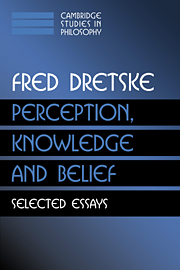Book contents
3 - The Pragmatic Dimension of Knowledge
Published online by Cambridge University Press: 19 December 2009
Summary
Knowing that something is so, unlike being wealthy or reasonable, is not a matter of degree. Two people can both be wealthy, yet one can be wealthier than the other; both be reasonable, yet one be more reasonable than the other. When talking about people, places, and topics (things rather than facts), it makes sense to say that one person knows something better than another. He knows the city better than we do, knows more Russian history than any of his colleagues, but doesn't know his wife as well as do his friends. But factual knowledge, the knowledge that something is so, does not admit of such comparisons. If we both know that today is Friday, it makes no sense to say that you know this better than I. A rich man can become richer by acquiring more money, and a person's belief (that today is Saturday, for example) can be made more reasonable by the accumulation of additional evidence, but if a person already knows that today is Friday, there is nothing he can acquire that will make him know it better. Additional evidence will not promote him to a loftier form of knowledge – although it may make him more certain of something he already knew. You can boil water beyond its boiling point (e.g., at 300° F) but you are not, thereby, boiling it better. You are simply boiling it at a higher temperature.
- Type
- Chapter
- Information
- Perception, Knowledge and BeliefSelected Essays, pp. 48 - 63Publisher: Cambridge University PressPrint publication year: 2000
- 4
- Cited by



